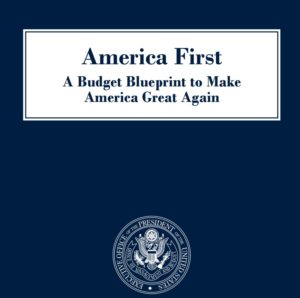 President Donald Trump is proposing to spend more than $1.4 billion to expand public and private school choice.
President Donald Trump is proposing to spend more than $1.4 billion to expand public and private school choice.
The president today released a broad outline of his spending plan. The $59 billion education budget would boost funding for the federal Charter Schools Program, set aside $250 million for an unspecified private school choice initiative, and increase federal funding to support low-income students while pushing districts to use it in a choice-friendly way.
The plan received a mixed reaction among education reformers. They generally praised Trump’s support for school choice. But some criticized proposed cuts to other programs, and others expressed skepticism about the federal role in education.
The charter school program supports startup schools, as well as state initiatives designed to improve charter school quality. Florida received more than $58 million of its most recent installment, the largest share of any state. Trump has proposed increasing the $333 million program by $168 million, or roughly 50 percent.
National Alliance for Public Charter Schools President Nina Rees issued a statement of appreciation for additional charter school funding.
“In the current school year, more than 200,000 new students are attending charter public schools, bringing nationwide enrollment to more than 3 million students,” she said. “Still, there could be at least another 2 million students whose parents would enroll them in charter schools if they could. Increased funding for the CSP is essential to expanding charter school capacity and reducing the wait for these families.”
Other supporters of charter school grants, like the National Association of Charter School authorizers, said they were “deeply concerned” about cuts elsewhere in the president’s plan.
John King, president of the Education Trust, said proposed cuts to college financial aid and teacher training programs “would move our country backward.”
“They would hurt low-income students trying to pay for college and prepare themselves for the workforce, educators seeking to improve their skills to better serve our nation’s young people and the very schools responsible for educating our nation’s most vulnerable students,” King said in a statement. “If this proposal were enacted, all students, particularly students of color and low-income students, throughout the entire continuum of our education system would suffer, as would the nation’s businesses who desperately need a skilled workforce to be successful.”
Some conservative reformers, like Lindsey Burke of the Heritage Foundation, were more supportive of the proposed reductions. Education Week reported Burke questioned the creation of new federal school choice programs, but praised a Trump proposal to make Title I funding students portable.
The president recommends a $1 billion increase for the program, which is intended to help high-poverty schools increase services for disadvantaged students. His budget blueprint states the increase is “dedicated to encouraging districts to adopt a system of student-based budgeting and open enrollment that enables federal, state and local funding to follow the student to the public school of his or her choice.”
Trump’s budget signals his priorities to Congress, which ultimately decides how to spend federal money. According to EdWeek, Sen. Roy Blunt, a Missouri Republican who chairs the appropriations subcommittee that deals with education, indicated he wasn’t completely on board.
“The president’s budget is the first step in the appropriations process,” he said in a statement. “There are many concerns with non-defense discretionary cuts.”
School choice has garnered the national spotlight as Education Secretary Betsy DeVos has repeatedly cited Florida, and its tax credit scholarship program specifically, as a model for the nation. The program currently helps nearly 98,000 low-income and working class students afford private school tuition. Step Up For Students administers the scholarship program and publishes this blog.
The spending proposal doesn’t address tax issues, so it’s not clear whether the Trump administration will propose a tax credit program at some point in the future. What is clear, as his recent visits to Tennessee and Florida suggest, is that the president is making school choice a priority.


